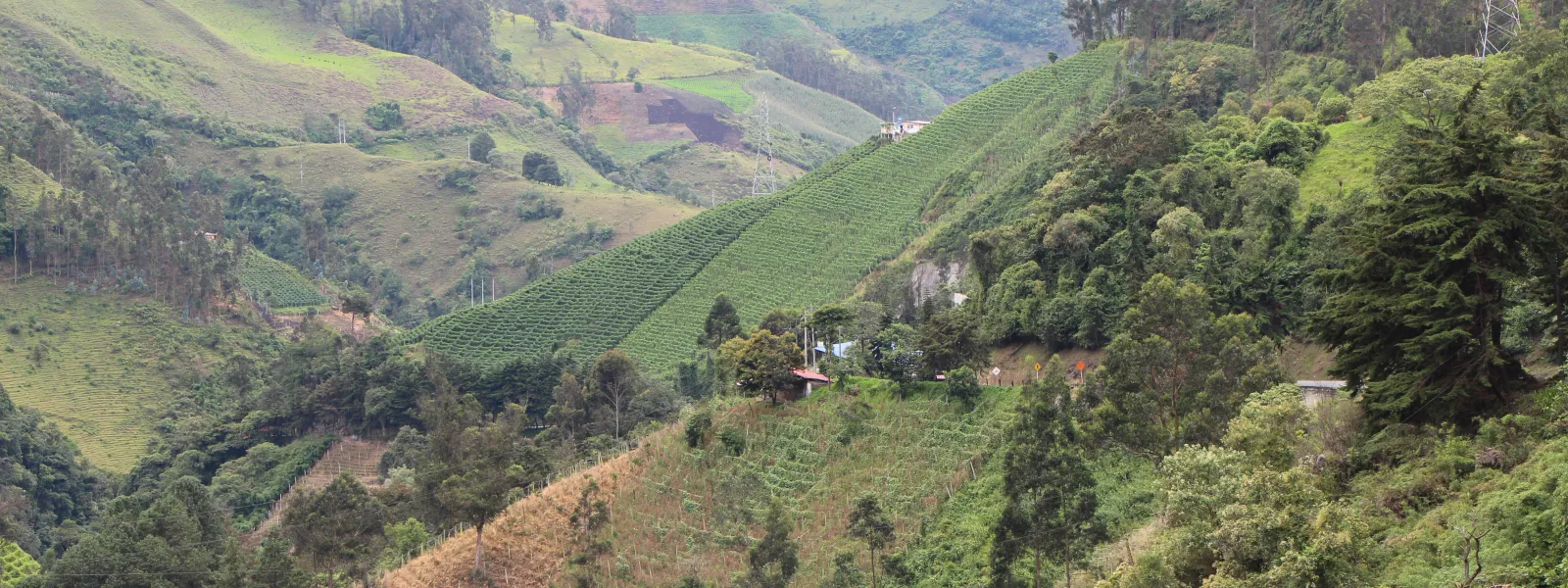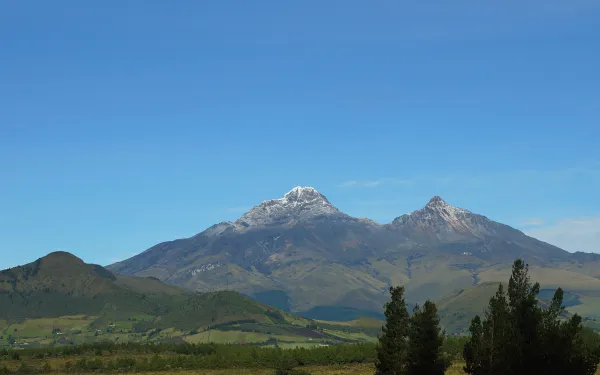
Project
Photo: Andrés Ángel / AIDASupporting Cajamarca’s fight to defend its territory from mining
Cajamarca is a town in the mountains of central Colombia, often referred to as "Colombia’s pantry” due to its great agricultural production. In addition to fertile lands, fed by rivers and 161 freshwater springs, the municipality features panoramic views of gorges and cloud forests. The main economic activities of its population—agriculture and tourism—depend on the health of these natural environments.
The fertile lands of Cajamarca are also rich in minerals, for which AngloGold Ashanti has descended on the region. The international mining conglomerate seeks to develop one of the world’s largest open-pit gold mines in the area. Open-pit mining is particularly damaging to the environment as extracting the metal involves razing green areas and generating huge amounts of potentially toxic waste
The project, appropriately named La Colosa, would be the second largest of its kind in Latin America and the first open-pit gold mine in Colombia. The toxic elements that an operation of that magnitude would leave behind could contaminate the soil, air, rivers and groundwater.
In addition, storms, earthquakes, or simple design errors could easily cause the dams storing the toxic mining waste to rupture. The collapse of similar tailings dams in Peru and Brazil in recent years has caused catastrophic social and environmental consequences.
On March 26, 2017, in a popular referendum, 98 percent of the voters of Cajamarca said “No” to mining in their territory, effectively rejecting the La Colosa project. AIDA is proud to have contributed to that initiative. But even with this promising citizen-led victory, much work remains.

Related projects
Report on the situation in La Oroya (Peru): When investor protection threatens human rights
The International Federation for Human Rights (FIDH) presented a balance of the controversial case of industrial pollution. Huancayo, Peru – The International Federation for Human Rights (FIDH) released a report on the situation in La Oroya, a city in the central Andean region of Peru that is at the center of a controversial case of industrial pollution caused by a poly-metallic smelter in operation since 1922. For decades, the people of La Oroya have been exposed to high levels of air pollution stemming from the complex’s emissions of toxic substances including lead, cadmium, arsenic and sulfur dioxide. In the middle of the 2000s La Oroya was identified as one of the 10 most polluted cities in the world. According to independent studies, 97% of children between the ages of 6 months and 6 years, and 98% of those between 7 and 12 years old still have high levels of lead in their blood. The percentage reaches 100% in La Oroya Antigua, the area closest to the smelter. The effects of lead poisoning are irreversible. Doe Run Peru, a subsidiary of the U.S.-based Doe Run Company, began operating the complex after its privatization in 1997. Both the company and the Peruvian State have failed to comply with their obligations to prevent environmental impact and respect the human rights of the population of La Oroya. In response, the Interamerican Association for Environmental Defense (AIDA) and other organizations requested the Inter-American Commission on Human Rights (IACHR) in 2005 to issue precautionary measures for people whose health was at serious risk from the pollution in the city. On August 31, 2007 the IACHR ordered the State to adopt measures to protect the health, integrity and life of a group of residents of La Oroya. The precautionary measures require Peru to provide a specialized medical diagnostic to the beneficiaries plus specialized and adequate medical treatment to those who, based on the diagnosis, are in danger of irreparable damage to their physical integrity or lives. Also since 2007, a complaint against Peru has been pending before the IACHR for the violation of human rights due to the toxic emissions from the La Oroya Metallurgical Complex. AIDA, APRODEH, Earthjustice and the Center for Human Rights and Environment (CEDHA) are representing the victims and the beneficiaries of the precautionary measures in the case. “AIDA has been working and monitoring the situation in La Oroya for over a decade. Over this time we have seen the extent of the damage to victims’ health in La Oroya due to the pollution that they have been and continue to be exposed to. The State must assume its obligations and fully comply with the IACHR´s precautionary measures that are in effect”, said Maria Jose Veramendi, an AIDA legal advisor. Meanwhile, parents of children with high levels of lead in their blood have tried to obtain compensation for the damages through a collective action in the United States (Missouri), headquarters of the complex’s parent company The Renco Group. In late 2010, Renco initiated international arbitration alleging its rights as a foreign investor as guaranteed by the Free Trade Agreement between Peru and the United States were violated. Renco asked for compensation of $800 million. “The company not only denied the impacts on the citizens and tried to evade responsibility, but in the face of the protests it pursued a campaign of stigmatization and attacks against those who were trying to defend their rights”, said Souhayr Belhassen, president of the FIDH. This case illustrates the conflict between international human rights law and investor protection. It also exposes the legal strategy of the companies allegedly involved in human rights violations that seek to evade responsibility and deny victims their right to reparation. The FIDH report, entitled Metallurgical Complex of La Oroya: When investor protection threatens human rights, includes a series of recommendations directed at the Peruvian authorities and the company involved. AIDA and APRODEH, as organizations representing the victims of La Oroya before the Inter-American Human Rights System, thank the FIDH and believe that the report is an important contribution to visualize the increasingly serious human rights violations suffered by the residents of La Oroya, who still expect the State to recognize its responsibility and bring justice to their claims. At the same time, the Archdiocese of Huancayo, whose role in defending the right to a healthy environment in La Oroya has been crucial, says the report is a major contribution to its work. See de PDF version of the report.
Read more
AIDA and CEMDA joint report on the UPR of Mexico
In accordance with the guidelines of the Human Rights Council, the Mexican Environmental Law Center (CEMDA) and the Interamerican Association for Environmental Defense (AIDA) present comments on the extent of Mexico’s compliance with the recommendations the country accepted as part of the 2009 Universal Periodic Review (UPR). We also present comments on other human rights violations related to environmental issues, which we believe should be taken into consideration during the next Universal Periodic Review set to take place later this year.
Read moreGroups seek investigation into Mexico’s approval of four “mega resorts”
FOR IMMEDIATE RELEASE April 11, 2013 Media contacts: Mexico Sandra Moguel, [email protected], +52 (164) 621-02353 USA Sarah Burt, [email protected], +1 (415) 217-2055 Serena Ingre, [email protected], +1 (415) 875-6155 Groups seek investigation into Mexico’s approval of four “mega resorts” Massive tourism developments threaten fragile ecosystems and endangered species San Francisco, USA/La Paz, Mexico. In a petition submitted to the Commission for Environmental Cooperation, eleven conservation groups charged the Mexican government with failing to enforce its own environmental laws in authorizing the construction of four “mega resorts” in the Gulf of California. The Commission is an international body established under the North American Free Trade Agreement to promote cooperation among Canada, Mexico and the U.S. on environmental issues of continental concern. “The Mexican authorities’ approval of massive tourism projects in violation of environmental laws is unacceptable and demonstrates little regard for threatened species, the environment and local communities”, said Sandra Moguel of the Inter-American Association for Environmental Defense, and one of the signers of the petition. “We urge the new Administration and Minister Guerra Abud to ensure that the approval process of development projects is transparent and not arbitrary”. The approval of projects such as Cabo Cortés, Paraíso del Mar, Entre Mares, and Playa Espíritu threatens the unique coral reefs and mangrove ecosystems of the region, and endangered species such as humpback and gray whales, whale sharks, manta rays, sea turtles, sea lions, jaguars, crocodiles and many species of migratory birds. The petition highlights the four projects as examples of the Mexican Ministry of Environment and Natural Resources’ repeated failure to enforce environmental laws when approving large-scale tourist development projects in the Gulf of California. In particular, the government ignores laws requiring effective environmental impact assessment, protection of endangered species, and conservation of coastal ecosystems. The petitioners are requesting that the Commission investigate and develop a factual record to examine Mexico’s lack of enforcement of its environmental laws when authorizing these developments. Such a finding would pressure Mexico to comply with its own environmental safeguards. “These natural treasures are of importance to Mexican communities that depend on them as cultural, economic and recreational resources”, says Judith Castro with the Friends for the Conservation of Cabo Pulmo. “Mexico cannot continue to approve mega projects that displace residents, bulldoze wildlife habitat, and pollute the waters of this vital ecosystem”. Known as the “World’s Aquarium”, the Gulf of California is considered one of the most diverse marine regions on the planet, and is home to thousands of species. Specifically, these mega projects, two of which are already under construction, threatened the following critical areas in the region: Cabo Pulmo National Park: One of the healthiest coral reef systems in the world, a UNESCO World Heritage Site and a Ramsar Wetland of International Importance, Cabo Pulmo is threatened by massive developments like Cabo Cortés. The Cabo Cortés proposal included the equivalent of nearly 30,000 guest rooms in its hotels, condominiums and villas, two 27-hole golf courses, a 490 berth marina, and a system of canals and artificial lakes. Additionally, because the region has a desert climate without sufficient water to accommodate such amenities and the expected population growth, the proposal included a desalination plant that could have discharged hypersaline brine into the reef. While the project was ultimately rejected in June 2012, Cabo Pulmo is threatened by similar developments still being considered. The Marismas Nacionales Wetlands: Playa Espíritu, a project already under construction that includes three golf courses, two marinas, a wastewater plant, and additional infrastructure spread across more than 35,000 acres, threatens the Marismas Nacionales, the most extensive and well-preserved mangrove forest habitat on the western coast of Mexico, and home to more than 280 species of migratory and resident bird species. The Bay of La Paz: One of the most productive water bodies in the Gulf of California and an important area for nesting birds, the Bay of La Paz is jeopardized by two adjacent projects, Paraíso del Mar, currently under construction, and Entre Mares, proposed for construction on a sandbar extending into the bay. Combined, these two projects will develop nearly ten thousand hotel rooms, plus 4,000 homes, two golf courses and a large marina and would bring an additional population of more than 10,000 people in high season. Earthjustice and the Interamerican Association for Environmental Defense (AIDA) are filing the petition on behalf of the Ecological Network for Escuinapa Development (REDES), Friends for the Conservation of Cabo Pulmo (ACCP), WiLDCOAST, SUMAR, Los Cabos Coastkeepers, Alliance for the Sustainability of the Mexican Coastal Northwest (ALCOSTA), the Natural Resources Defense Council (NRDC), Greenpeace México and AIDA. The petitioners are calling on Mexico to protect the marine and coastal ecosystems of the Gulf of California, particularly coral reefs like the ones in Cabo Pulmo. “By approving these projects, Mexico is failing its obligations to protect wetlands, coral reefs and species of environmental and international importance”, said Carolina Herrera, Latin America Advocate with the Natural Resources Defense Council. “What this region in the Gulf of California needs is low-impact sustainable development where the well-being of local communities and the environment is the first priority”. A map of the projects, photos, videos, and background information are available at: http://earthjustice.org/cortes Read the petition here: http://earthjustice.org/documents/legal-document/pdf/petition-to-commission-english
Read more